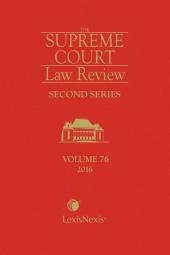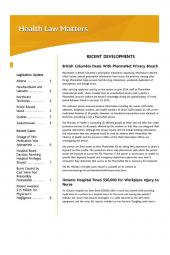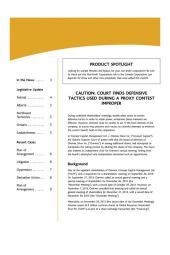Supreme Court Law Review, 2nd Series, Volume 76
One Year Subscription Only Terms
Subscribers receive the product(s) listed on the Order Form and any Updates made available during the annual subscription period. Shipping and handling fees are not included in the annual price.
Subscribers are advised of the number of Updates that were made to the particular publication the prior year. The number of Updates may vary due to developments in the law and other publishing issues, but subscribers may use this as a rough estimate of future shipments. Subscribers may call Customer Support at 800-833-9844 for additional information.
Subscribers may cancel this subscription by: calling Customer Support at 800-833-9844; emailing customer.support@lexisnexis.com; or returning the invoice marked 'CANCEL'.
If subscribers cancel within 30 days after the product is ordered or received and return the product at their expense, then they will receive a full credit of the price for the annual subscription.
If subscribers cancel between 31 and 60 days after the invoice date and return the product at their expense, then they will receive a 5/6th credit of the price for the annual subscription. No credit will be given for cancellations more than 60 days after the invoice date. To receive any credit, subscriber must return all product(s) shipped during the year at their expense within the applicable cancellation period listed above.
Product description
This Volume is a collection of papers reviewing noteworthy Constitutional Law decisions of the Supreme Court of Canada released in 2015. The Volume covers cases presented at Osgoode Hall Law School's 19th Annual Analysis of the Constitutional Decisions of the Supreme Court of Canada. Major decisions discussed include Carter v. Canada (Attorney General) (assisted dying) and R. v. Nur (mandatory minimum sentence).
Table of contents
OVERVIEW
1. Lorne Sossin – Constitutional Cases 2015: An Overview
PART I: DIRECTIONS IN COOPERATIVE FEDERALISM
2. Eric M. Adams – Judging the Limits of Cooperative Federalism
3. Kate Glover – Structural Cooperative Federalism
4. Warren J. Newman – The Promise and Limits of Cooperative Federalism as a Constitutional Principle
PART II: LIBERTY, LIFE & JUSTICE
5. David Lepofsky – Carter v. A.G. Canada (Attorney General) , The Constitutional Attack on Canada's Ban on Assisted Dying: Missing an Obvious Chance to Rule on the Charter's Disability Equality Guarantee
6. Colin Grey – Thinkable: The Charter and Refugee Law after Appulonappa and B010
PART III: ACTORS AND INSTITUTIONS OF CRIMINAL JUSTICE
7. Dr. Emma Cunliffe – Henry v British Columbia: Still Seeking a Just Approach to Damages for Wrongful Conviction
8. Amy Salyzyn – A False Start in Constitutionalizing Lawyer Loyalty in Canada (Attorney General) v. Federation of Law Societies of Canada
9. Hart Schwartz and Anthony Robert Sangiuliano – The Pragmatic Limits of Access to Justice
PART IV: THE CONSTITUTION AND COMMUNITIES
10. Víctor M. Muñiz-Fraticelli – Mouvement laïque québécois v Saguenay: Neutrality and Narrative
11. Jonnette Watson Hamilton and Jennifer Koshan – Kahkewistahaw First Nation v. Taypotat: An Arbitrary Approach to Discrimination
12. Nicolas M. Rouleau – Caron, Carter, and Bedford at the Supreme Court of Canada: Society Can Change But History Will Always Stay the Same
PART V: THE BOUNDARIES OF CRIMINAL LAW: CRIME AND PUNISHMENT
13. Christopher Sherrin – R v Smith and Judicially Reviewing the Scope of Criminal Law under the Charter
14. Steven Penney – "Chartering" in the Shadow of Lochner: Guindon, Goodwin and the Criminal-Administrative Distinction at the Supreme Court of Canada
15. Janani Shanmuganathan – R. v. Nur: A Positive Step but not the Solution to the Problem of Mandatory Minimums in Canada
PART VI: ELECTORAL REFORM: CONSTITUTIONAL CONSTRAINTS AND COMPARATIVE PERSPECTIVES
16. Yasmin Dawood – The Process of Electoral Reform in Canada: Democratic and Constitutional Constraints
17. Michael Pal – Constitutional Amendment After the Senate Reference and the Prospects for Electoral Reform
18. Emmett Macfarlane – Constitutional Constraints on Electoral Reform in Canada:Why Parliament is (Mostly) Free to Implement a New Voting System
 Lexis Nexis
Lexis Nexis 

